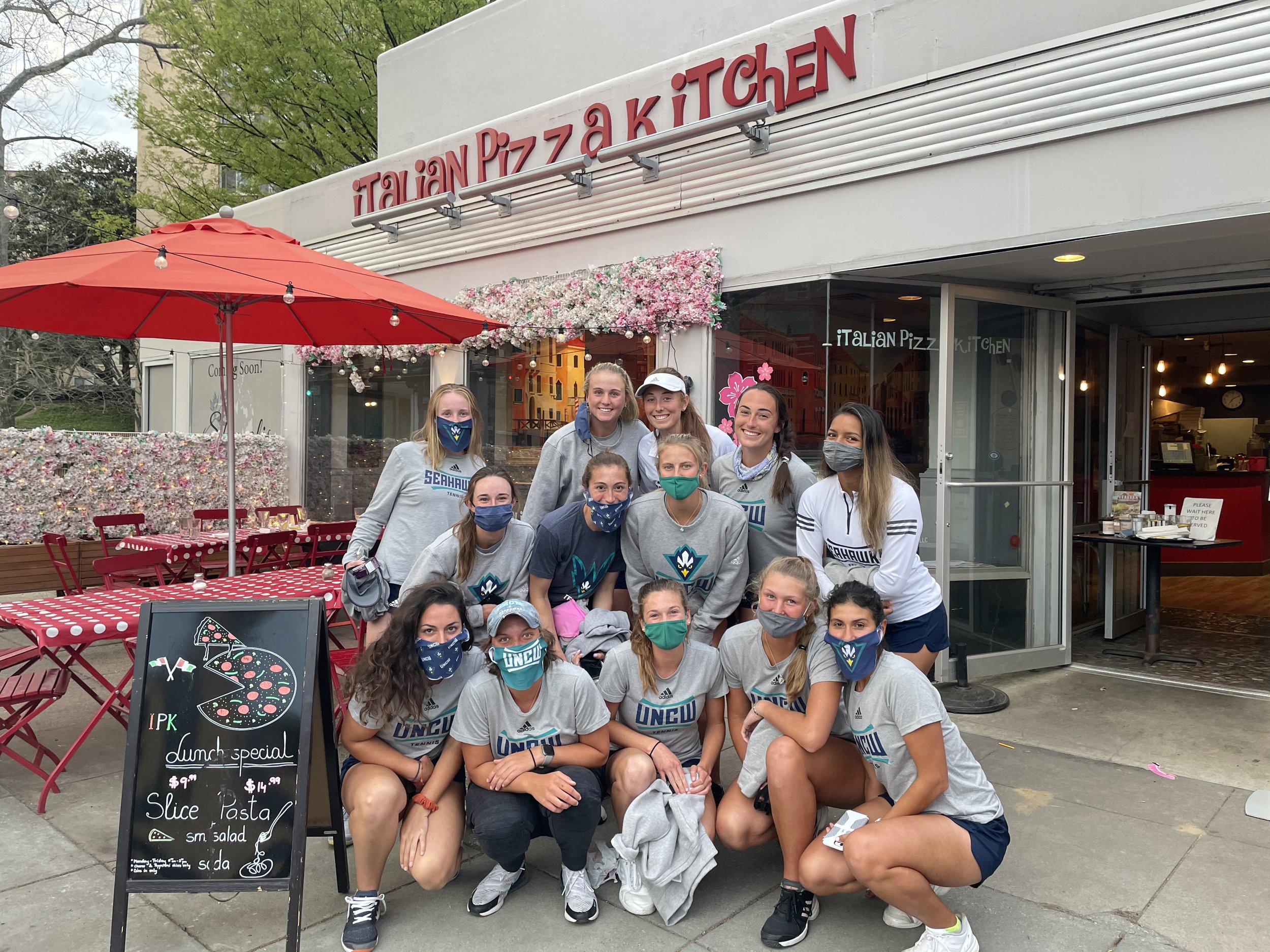Ghost kitchens, freezers and composting: How a neighborhood pizzeria thrived and cut waste during covid
A group photo at neighborhood restaurant, Italian Pizza Kitchen.
A family-owned eatery that makes sauces, pasta and pizza from scratch, Italian Pizza Kitchen, like most restaurants, suffered a major drop in business when covid hit. But management at the DC restaurant deployed strategies that helped them not only stay in business, but grow and lighten their environmental impact.
Looking to avoid waste and keep all employees on the payroll, they started several “ghost kitchens,” each specializing in cuisines that were different from the restaurant’s pizza offerings, but used similar ingredients. Listed in delivery apps, even though they had no storefronts, the ghost kitchens attracted more diners and increased demand.
Now Italian Pizza Kitchen, in DC’s Van Ness neighborhood, is busier than ever and working even harder to minimize its environmental footprint. With a Food Waste Innovation Grant from D.C.’s Department of Small and Local Business Development, the restaurant recently increased its freezer capacity and started composting. General Manager Maryna Grabchuk estimates that food has gone from 10 - 15 percent of their waste at the start of the pandemic to 1 - 3 percent today. Next year they’re looking at trialing reusable takeout containers. RescueDish’s Rachael Jackson spoke to Grabchuk about reducing waste, staying afloat during covid and connecting with customers on sustainability. Here’s what she had to say.
On covid’s initial impact:
During covid, business became unstable. One day you can be super busy, another day, you're much slower. Our business is located in between three universities, Howard, UDC and American University, and the campuses were closed. We lost a lot of customers.
So we had a lot of leftover food sometimes. We did donations to the hospital. Then we started using Too Good To Go.
On selling extra food at a discount through the Too Good To Go app:
By the end of the day, let’s say you have some leftover prepared food So, with Too Good To Go people can buy a “surprise bag” of food for a third of the price. It might not cover the labor, but at least the food is not going to waste and you're making the person happy because they’re getting food they can afford. During covid a lot of people lost their jobs or people couldn't afford as much, so it was a very good app for them. A lot of students use it.
When Grabchuk’s team took over Italian Pizza Kitchen they deleted menu items that weren’t selling well and started working with a food supplier who could deliver more than once a week — these steps helped them reduce food waste and operate more efficiently. Then, when covid hit, they found even more ways to reduce their waste, while also growing their business.
On creating “ghost kitchens” to cut waste and stay afloat during covid:
We needed to keep the business running and survive; we didn’t want a lot of leftover food. So we came up with our ghost kitchen project. We created five different sub-restaurants. They’re like virtual restaurants that don’t have dining locations, but are available through GrubHub, DoorDash and UberEats. So the customer sees them online and can order for delivery. Our ghost kitchens offer different types of food made with ingredients we have at Italian Pizza Kitchen. For example, Empanada Woman. We created the empanadas with ingredients we had.
We also came up “Mac N Cheese Attack.” I figured out that people really love mac and cheese! Now we even have mac and cheese pizza and a mac and cheese sandwich.
And we started having a lot of orders. We grew our business and that’s how we survived during covid and at the same time reduced our food waste and kept everybody on the payroll. We didn’t lay anyone off.
Editors note: Italian Pizza Kitchen continues to operate five ghost kitchens, which you can find on delivery apps: Empanada Woman, Mac N Cheese Attack, Winey Pasta, Sassy WingZ, and Aasta La Pizza.
Empanada Woman’s listing on DoorDash.
On how composting has helped clean up their alley:
When we saw the composting program we were excited to start as soon as possible. We worked closely with the company and picked the right container, which can be stored inside the restaurant. It’s completely sealed so nothing can get in there.
Behind Italian Pizza Kitchen, there’s a little park, Soapstone Park. A lot of people walk there with their pet friends. We’ve received a lot of feedback that it's much cleaner right now and the smell is gone. It's significantly changed the number of raccoons and rats, since they have nothing to eat.
On how grant funding for additional refrigeration and freezer space has helped cut waste:
When we started doing the ghost kitchens we had to order more frequently and we didn't have any space to store the food. We had a freezer, but it was not that big and we couldn't store that much so we had to order like every day and that’s a lot of fees. We applied for the freezer so we could buy more food and just use whatever we needed. We really appreciate the government choosing us. The freezer we have right now is three times bigger than the freezer that we had before.
On how a freezer and vacuum sealer make it easier to manage unpredictability:
You never know what people want. Like, Thanksgiving, a lot of people are going out of town but at the same time a lot of people are coming into town to see their families. You never know if it's going to be busy or slow those days.
But now when we see the day kind of slow going, we have a special machine, which seals the food without air, and we just put it in the freezer. So it stays fresh.
On transitioning to reusable takeout containers:
We’re thinking about implementing reusable containers in the near future, maybe within four months. There are two ways to do it. You can buy the full capacity and the customers are charged for the container, but when they bring the container back they get refunded the money. In the second way to do it, a company provides reusable containers and the customers have to drop them off somewhere so they can sanitize them and deliver them to the restaurant again.
On how much they’ve lowered the percentage of their garbage that is food:
I would say that maybe 10 - 15 percent was food and we lowered that to 1 - 3 percent.
On customer response to their composting and other waste-cutting initiatives:
We posted a little note on the window to share that we are composting. People want to dine in places that care about the environment.




